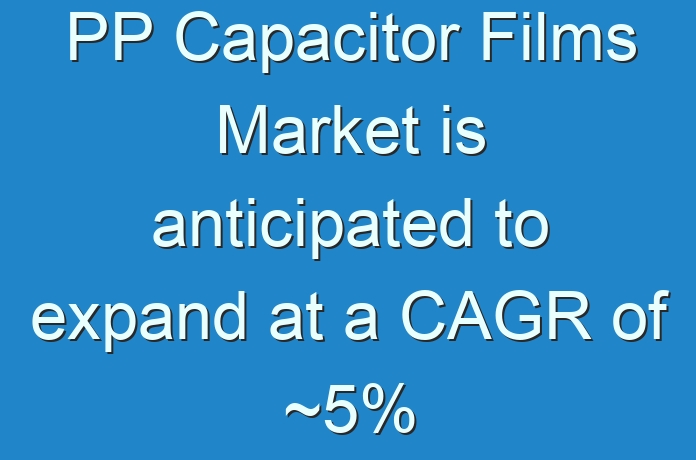
Global PP Capacitor Films Market: Key Highlights
- The global PP capacitor films market was valued at ~US$ 2.2 Bn in 2018, and is anticipated to expand at a CAGR of ~5% during the forecast period.
- The global PP capacitor films market is driven by the rise in the demand for smart grids and renewable energy.
- Asia Pacific accounts for a major share of the global PP capacitor films market, led by the robust demand for electric vehicles in the region.
Key Drivers of Global PP Capacitor Films Market
- Electric and hybrid vehicles are gaining popularity due to their low consumption of fuel and lesser environmental footprint. Increase in the demand for electric energy storage devices used under extreme conditions in electric vehicles is driving the demand for PP capacitor films, as they offer excellent thermal stability and energy density.
- In recent years, the development of vehicles with safety features and automatic driving mechanism, such as on-board components and advanced driver assistance systems (ADASs), has gained momentum. This factor is driving the demand for small-size capacitors with high capacities, which can withstand high temperatures.
- Several leading manufacturers of capacitors are engaging with material suppliers to improve the operations of film capacitors for future electric and hybrid electric vehicles. The use of high-quality PP films in capacitors improve the upper limit of operating temperature and increase the dielectric constant. PP films can withstand temperatures of up to 105° C, and even higher for a short period of time. These factors are likely to drive the demand for PP capacitor films in the automotive industry.
Request A Sample of PP Capacitor Films Market –
China to Offer Attractive Opportunities
- China is a major supplier of PP capacitor films. Furthermore, it is developing a technology that is required for high electric and temperature purposes, to meet the demand for emerging as well as established applications. China is leveraging opportunities in growing eco-friendly sectors, such as power generation, electric vehicles, and other industries.
REQUEST FOR COVID19 IMPACT ANALYSIS –
https://www.transparencymarketresearch.com/sample/sample.php?flag=covid19&rep_id=74122
- Some companies are adopting the metal spraying process rather than the winding of PP films to improve product specifications. For instance, Foshan Shunde has incorporated the metal spraying process in its MKP-LM models, due to its advantages such as increased current-carrying capability, capacitance, and control over temperature.
- China is one of the major producers of capacitor films, globally. There are almost 200 suppliers of film capacitors in the country. Of the total capacitor films produced in the country, over 80% are consumed locally, and the remaining are exported to the U.S., Europe, the Middle East, and Asia.
More Trending Reports by Transparency Market Research –
Availability of Other Capacitor Films to Hamper Market
- Several substitutes of capacitor films such as PP and PET are available in the market. In special applications that require temperatures of more than 150° C, capacitors films made of polyethylene naphthalene or polyphenylene sulfide are employed.
- PET capacitor films have higher capacitance per volume due to their high dielectric constant as compared to PP capacitor films. Moreover, they are thinner than PP capacitor films. Furthermore, PET films have better mechanical resistance and higher exploitation temperature than PP capacitor films. They can operate at temperatures of up to 125° C.
- Ceramics are less expensive than PP capacitor films, and they are most widely used in electronic circuits, as the former offer high stability, have high capacity, reduce energy loss, and are compact than PP capacitor films. These factors are anticipated to hamper the PP capacitor films market in the near future.
Asia Pacific Dominates Global PP Capacitor Films Market
- Increase in the demand for PP capacitor films can be attributed to the rise in the demand for electric vehicles across the region. This has led to an increase in the production of electric vehicles, thus driving the PP capacitor films market in the region.
- Asia Pacific dominated the global PP capacitor films market in 2018, accounting for a market share of 64.7%. The PP capacitor films market in Asia Pacific is anticipated to expand at a CAGR of 5.5% during the forecast period. This can be attributed to the increase in the sales of electric vehicles and growing number of smart grids in the Asia Pacific region.
- Rise in the population in the region has led to high spending power, which is driving the automotive market, especially in China and India. This, in turn, is driving the demand for PP capacitor films in the region.
- The shares of the PP capacitor films markets of Latin America and the Middle East & Africa are anticipated to decline by 2027, due to the availability of other substitutes
Fragmented Nature of PP Capacitor Films Market
- The global PP capacitor films market is fragmented, comprising several domestic and global manufacturers. The top four players of the market cumulatively held 14% share of the global PP capacitor films market in 2018. These players include Shin-Etsu Chemical Co., Ltd., Toray Industries Inc., The Bolloré Group, and Borealis AG.
- Shin-Etsu Chemical Co., Ltd. accounted for a share of 5.2% of the global PP capacitor films market in 2018. This high share of the company can be attributed to its continuous focus on innovation, implementation of growth strategies, and expansion of its business through strategic capital allocation, and extensive research & development in its respective business domains.
Other key players operating in the global PP capacitor films market include Brückner Group GmbH, Birkelbach Kondensatortechnik GmbH, Steiner GmbH & CO. KG, Sungmoon Electronics Co. Ltd, and Terichem Tervakoski, a.s., among others.





